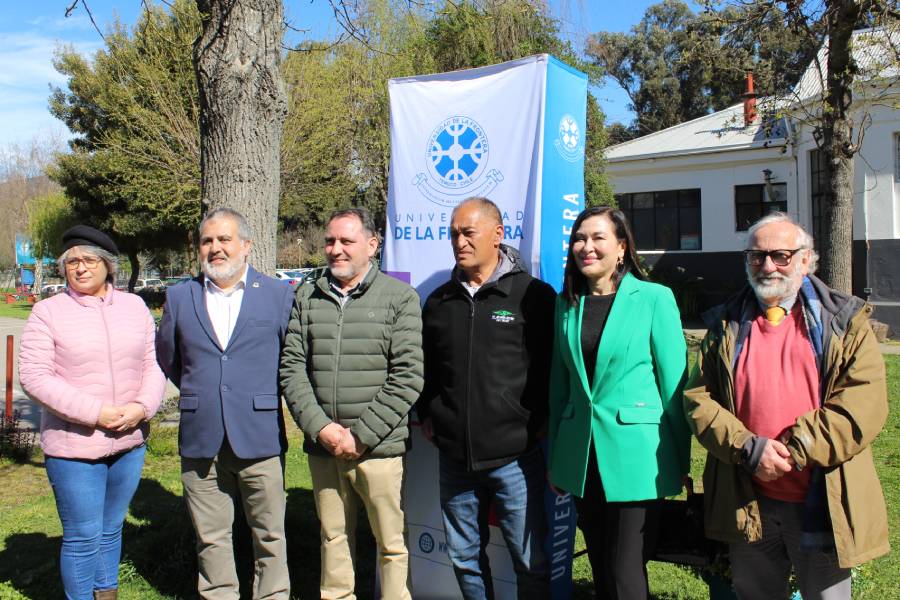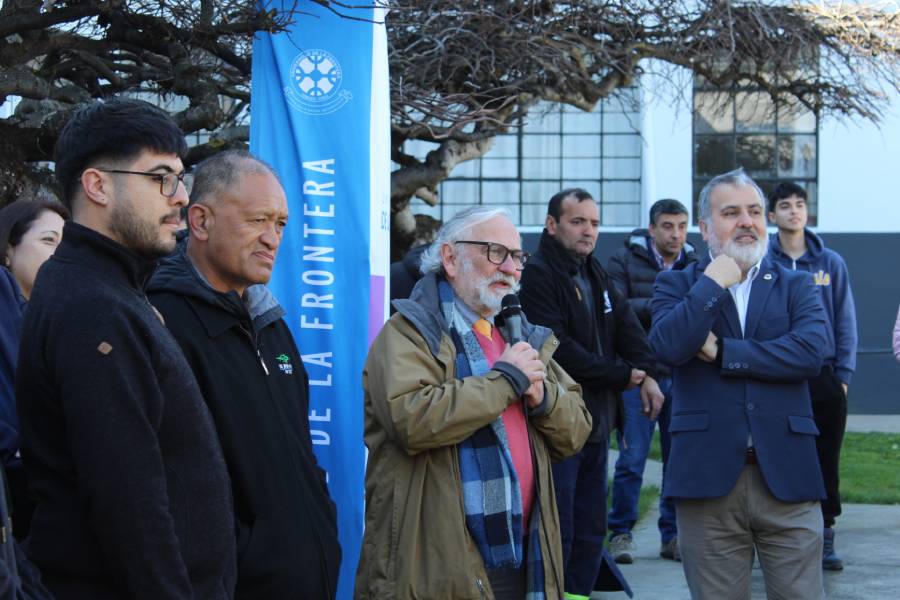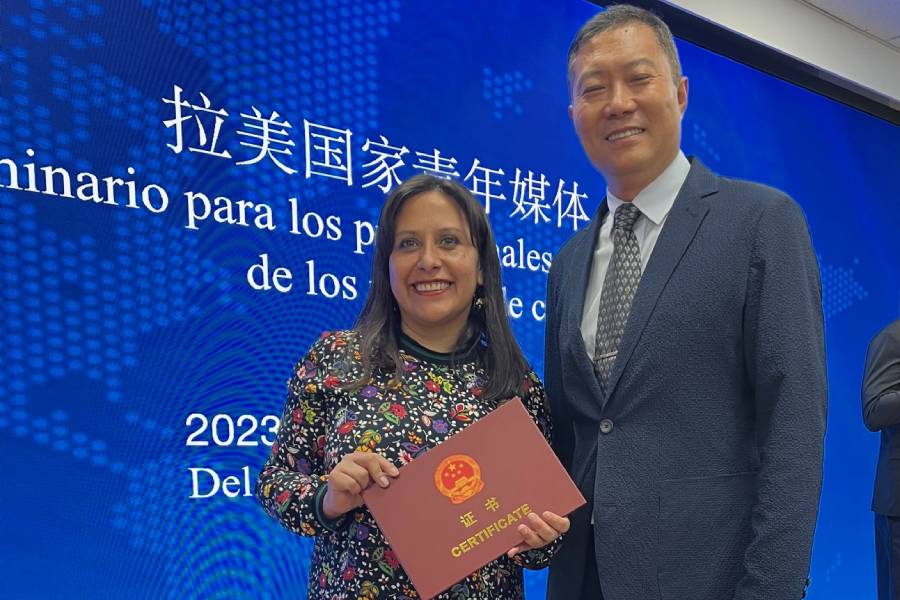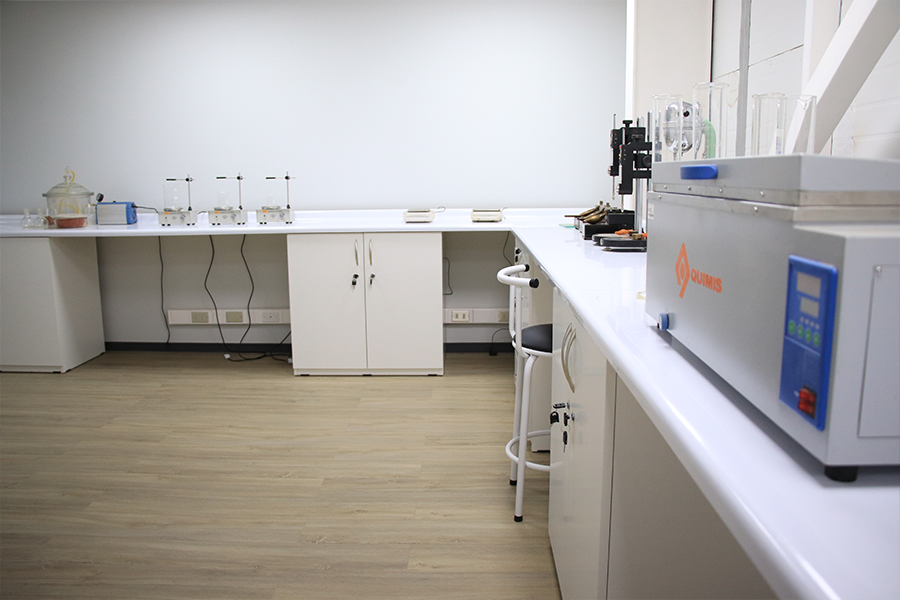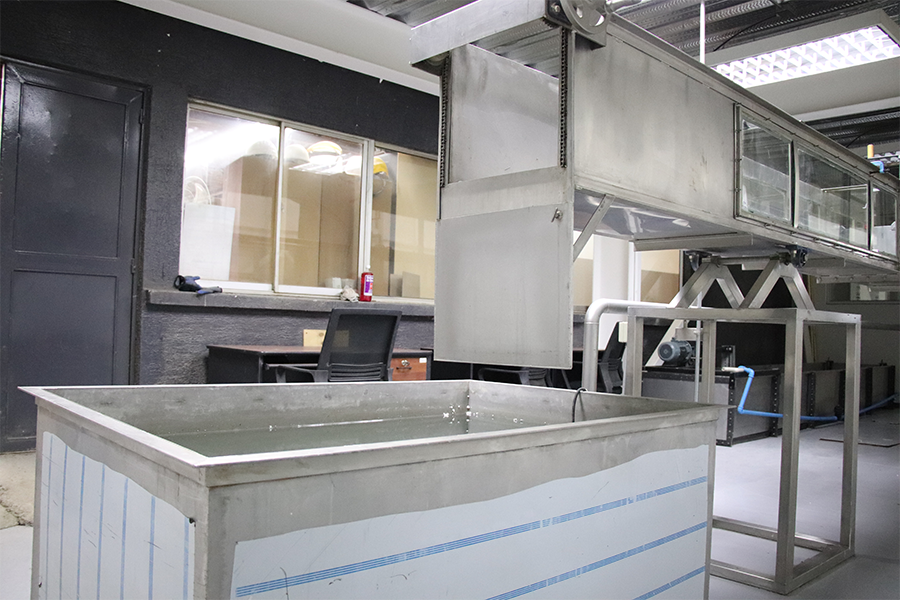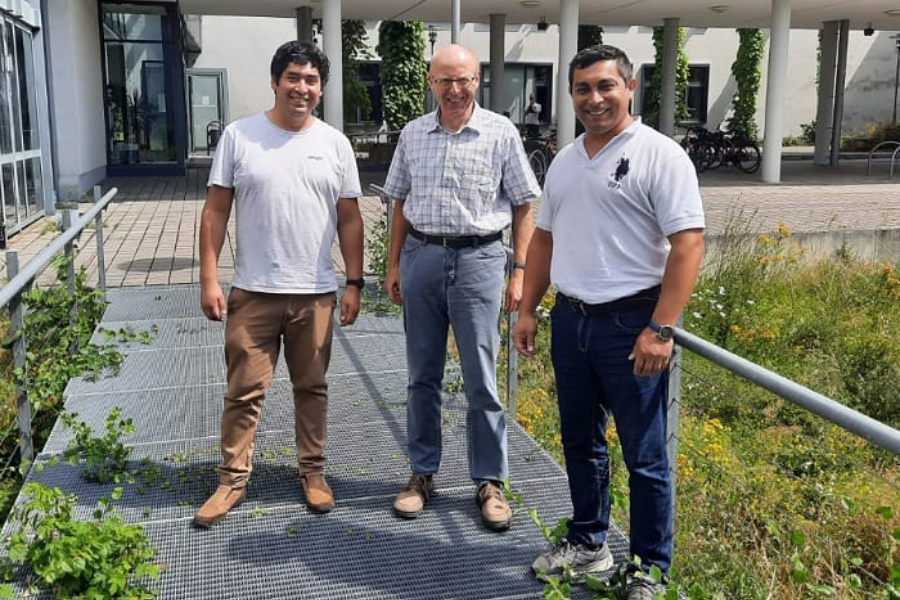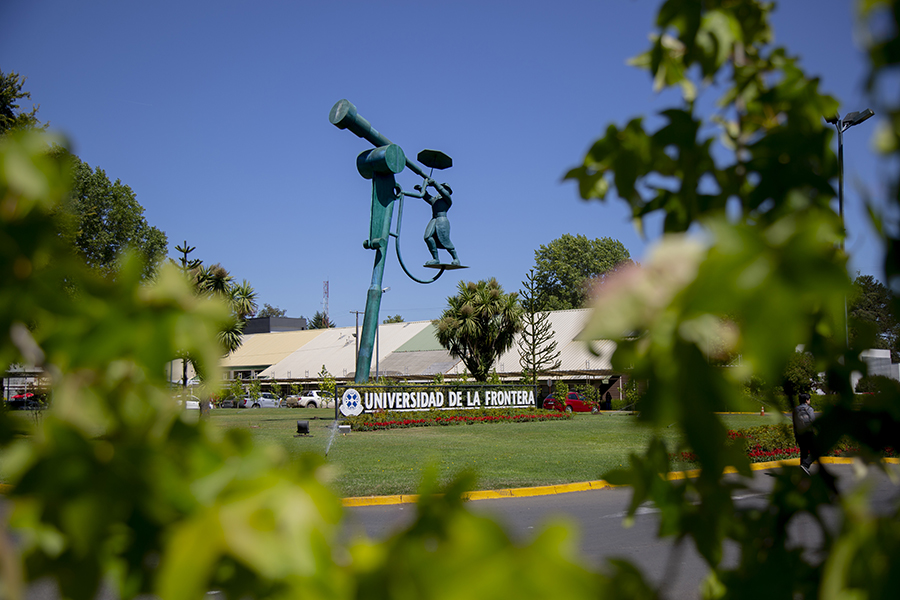|
The Māori delegation consisted of eight tourism entrepreneurs, ancestral leaders, and educational experts, who visited the Angol Campus of Universidad de La Frontera for an intercultural summit. |
Within the framework of the World Tourism Day, the Angol Campus of Universidad de La Frontera (UFRO) received the Māori delegation, which consisted of eight Māori leaders, who came for this historical visit to promote the understanding and cooperation between indigenous cultures: the Māori people from New Zealand and the Mapuche people from Chile. The summit started with a “Llellipún”, which is an ancestral ceremony in the Mapuche culture. It was led by the Mapuche leader (“machi” in the Mapuche language Mapuzungun) Marcos Millapi of the Chacaico community in Angol. This symbolically and spiritually rich ceremony served as a cultural bridge that connected the Māori community with the Mapuche community and the other attendees of the event. At the same time, the visitors performed the traditional “Pōwhiri”, a Māori welcome ceremony, which is a symbol of peace, respect, and mutual acknowledgement. At the event, it was also a sign of deep gratitude to the Mapuche community of Chacaico and the other attendees of the ceremony on the Angol Campus of UFRO. The Māori leader and tourism entrepreneur John Tapiata commented: “This gathering was a unique experience that reminds us of our home, since we respect our land and ancestors in New Zealand the same way as the Mapuche people here in Chile. We understand and see that our ancestors are connected with them and they are very happy with this gathering in Angol”. After the ceremonies, they got together for two meetings, organized by Angol Campus, the International Affairs Office, and the Department of Education of Universidad de La Frontera, in cooperation with the Malleco Chamber of Tourism. During these meetings, they emphasized the importance of this visit for the promotion of intercultural understanding and the cooperation in the fields of tourism and education. KNOWLEDGE EXCHANGE The first meeting took place with the Māori leaders and representatives of the local tourism industry, where they explored the cultural influence of the Māori and their experience in the field of tourism. They also discussed collaboration opportunities and shared ideas on how to promote and respect different cultures in the context of tourism. In the second meeting, the local community had the opportunity to learn more about the influence of the Māori people in the field of education. Therefore, the Maori leaders shared their experiences regarding the promotion of indigenous culture and education in New Zealand with the participating students and teachers from different schools in Angol, through a fruitful dialogue on how to strengthen the cultural identity through education. Sergio Bravo Pino, the director of the Angol Campus of Universidad de La Frontera, was honoured by the visit of the Māori delegation. “They came here to show us their experience regarding their educational system and how they approach tourism in their country, which is something that might be useful for the province of Malleco as well. We can really learn from them during this visit”, he commented. “It was a very emotional and meaningful day, and we are very pleased with the invitation of Universidad de La Frontera, who provided this space for cultural exchange in terms of tourism and education. Meetings like this allow us to learn from the experiences of other cultures and traditions”, explained Katia Guzmán Geissbühler, the director for Outreach and Community Engagement of the commune of Angol. During their visit, the Māori delegation also visited the Mapuche community of Chacaico and the Historical Museum Dillman S. Bullock of the commune of Angol, where they were able to immerse in the ancestral, cultural, and agricultural history of the commune. Written and translated by: UFRO Communications Office
|
|
Pamela Carrasco of Universidad de La Frontera obtained a scholarship to get to know the current challenges of journalism, together with 30 other professionals from Chile, Colombia, Costa Rica, Cuba, Panama, the Dominican Republic, Venezuela, and Uruguay. |
The professional journalist Pamela Carrasco Salas, of the Communications Office of Universidad de La Frontera (UFRO), received a scholarship from the Chinese National Radio and Television Administration (NRTA) to participate in the Seminar for Latin American Journalists, through the Chilean Agency for International Cooperation for Development (AGCID) and the Embassy of China in Chile. According to the professional who obtained this scholarship to get to know the current challenges of journalism together with 30 other professionals from Chile, Colombia, Costa Rica, Cuba, Panama, the Dominican Republic, Venezuela, and Uruguay, the connections with Chinese institutions are more evident than ever, despite the language and time difference and the extreme distance between South America and Asia. The seminar included numerous activities related to the development of communications, for which the participants travelled to Beijing and Shenyang, and visited media companies, as well as other companies and successful economic and social institutions. “When we talk about the internationalisation of our university, we have to expand our horizons, break down barriers, find our spaces, and act for more cultural understanding,” explained Pamela Carrasco. CHINA 5G “China’s advances in innovation and technology are really remarkable, not only because of the satellite buses’ real-time transmission, the 5G network in all provinces, or the 8K resolution. They are also a great example regarding the creation of content for all kinds of audiences and segments: children, adolescents, and senior citizens are not left out in the range of programmes and contents, and that is a good thing,” she affirmed. The offer of the China Central Television (CCTV) comprises 20 national and international channels, and special economy, culture, and sports channels, among others. The use of new technologies in the traditional industry is a great source of opportunities. PARTNERSHIPS WITH UFRO Universidad de La Frontera has three cooperation agreements with Chinese universities, the University of Jinan, Zhejiang University of Science and Technology, and the Communication University of China, which is UFRO’s counterpart of the Confucius Institute, one of the main bodies for the dissemination of Chinese culture in the world. According to the journalist Pamela Carrasco, the course allowed her to learn from professors of the Communication University of China and about fields of great interest, such as media development and exchange, cooperation between Chinese and Latin American media, media literacy in the information age, constructive journalism at the service of global issues, and content production and innovation in times of media convergence. “The cooperation with these teachers and also with former diplomats was a very enriching experience, also because of what it means to stop looking through the eyes of a Western country and to appreciate how this Asian country has approached the development of its television, radio and digital media industry, with a considerable international expansion,” she explained.
Written and translated by: UFRO Communications Office
|
|
The Department of Civil Engineering inaugurated its new building with classrooms, offices, and laboratories for research and the practical training of undergraduate and graduate students of the Faculty of Engineering and Science. |
The inauguration of this new space for the Department of Civil Engineering of Universidad de La Frontera (UFRO) is an important milestone for the development of the undergraduate and graduate students and researchers of the Faculty of Engineering and Science. These new classrooms and laboratories target the fields of soil mechanics, geophysics, hydrology, transportation, and structures, and reinforce the university’s commitment to academic excellence, offering its students and researchers a top-quality training to be able to face future challenges in the field of engineering. The dean of the Faculty of Engineering and Science, Dr. Jorge Farías Avendaño, added that this infrastructure is a fundamental pillar for the students. “These new installations will allow them to better face new technologies in the field of construction and design, and to be successful in their future work environments,” he explained. The project included the extension of the existing building’s second floor, with a workspace specifically for the administration of the department and offices for collaborative work of the department’s professionals and administrative staff; as well as the construction of an annex building with three floors. The first floor consists of laboratories for experimentation and analysis, the second floor offers spaces for research and academic development, with laboratories and classrooms for thesis students, and the third floor is designed to meet future academic needs, with an ideal environment for teaching, learning, and research. This project started about ten years ago and was implemented under the leadership of Dr. Viviana Letelier González, who highlighted the work and support of the academics, professionals, and administrative staff behind this important initiative. “These new spaces position our Department of Civil Engineering not only at the regional level but also in the south of Chile. The new state-of-the-art equipment will allow us to provide high-quality training and research, thus contributing to the global state of knowledge,” she commented. Undoubtedly, the most benefits are for the students, as for example Mariluz Huiriqueo Antivil, the head of the Civil Engineering Student Centre, who comments: “This magnificent equipment and the new installations are so important for our development as future professionals, and also for our practical training. We learn the theoretical part in the classroom and now, we can put that knowledge directly into practice. That is a great benefit that prepares us for our future work.” “ATMOSPHERIC RIVERS: THE GOOD, THE BAD AND THE UGLY…” During the inauguration activities, the civil engineer of Universidad de Chile with a Ph.D. in Meteorology from the University of Washington (USA), Dr. René Garreaud Salazar, gave a lecture on “Atmospheric rivers: the good, the bad and the ugly…”. In his presentation, he explained the phenomena of atmospheric rivers in Chile and their meteorological relevance, as well as the characteristics of beneficial rivers in terms of their water balance and snow cover, and of extremely dangerous rivers and their consequences. Written by: Melanie Tapia Caba |
|
Ph.D. student of Universidad de La Frontera carried out internship at Synthetic Organic Chemistry Group of University of Potsdam |
The student Víctor Marín Mosi, of the Doctoral Programme in Science with specialisation in Applied Cellular and Molecular Biology of Universidad de La Frontera (UFRO), carried out an internship at the University of Potsdam in Germany. During his stay, he joined the Synthetic Organic Chemistry Group, led by the academic Bernd Schmidt, to deepen his knowledge in the search for natural compounds with neuroprotective effects. “The aim of my internship was to elucidate the molecular structures of drimane sesquiterpenes isolated from Drimys Winteri (or Canelo tree), as part of the search for new bioactive compounds with protective effects against neuroinflammatory processes underlying neurodegenerative diseases such as Alzheimer’s and Parkinson’s,” explained Víctor Marín Mosi. The student added that his internship at the University of Potsdam was a central part of his doctoral thesis, which involves the search for natural compounds with neuroprotective effects. In addition, his stay allowed him to learn more about molecular determination methods, such as nuclear magnetic resonance spectroscopy (NMR) and X-ray diffraction (XRD), and about the chemical synthesis of new molecular derivatives, which allow conclusions based on the relation between structure and function. According to Víctor Marín, it is very important to interact with international research groups, since these partnerships undoubtedly strengthen the cooperation of UFRO with the rest of the world, and in addition, the professional development of the students when they participate in these internships abroad.
Written by: Doctorate in Science with specialisation in Cellular and Molecular Biology |
|
ACCESS is a platform that seeks to promote and facilitate the academic collaboration between Chile and Sweden and will allow UFRO to establish important international partnerships for advanced research. |
After diverse preparations, Universidad de La Frontera (UFRO) officially confirmed its entry into the prestigious platform Academic Collaboration Chile Sweden (ACCESS), a network for international collaboration between Chile and Sweden. ACCESS is a platform that seeks to promote and facilitate the academic collaboration between Chile and Sweden and will allow UFRO to establish important international partnerships for advanced research. According to Dr. Rodrigo Navia Diez, the Vice-rector for Research and Graduate Studies, UFROs participation in this platform is a milestone and an opportunity for internationalisation and international mobility. “The opportunity to be part of ACCESS is a very important milestone, because this collaborative platform, consisting of eight Swedish universities and eight Chilean universities, allows a series of activities in the fields of student and academic mobility, research and graduate studies, which promote the internationalisation of our university. We hope that this platform will somehow strengthen our research and our work in the fields of graduate studies and internationalisation,” he commented. The incorporation of UFRO into the platform ACCESS is the result of a cooperative work between the Vice-rectorate for Research and Graduate Studies, the International Affairs Office, and Dr. Iván Velásquez, an academic of UFROs Faculty of Engineering and Science, who initiated the conversations during a recent trip in order to materialise this impulse of development and collaboration. “The idea is to expand and exchange knowledge between the universities’ researchers and to promote student exchange, visits, internships and graduate studies, as well as to develop joint doctoral courses,” explained Dr. Velazquez. The ACCESS platform started in 2016, with the Swedish universities Lund University and Uppsala University and the Chilean universities Pontificia Universidad Católica de Chile and Universidad de Chile, with the aim of facilitating and deepening the academic relations between Chile and Sweden. At that time, the founding members of the platform collectively agreed on the framework and decided to create research seminars in Chile and Sweden. Written by: Vice-rectorate for Research and Graduate Studies |





